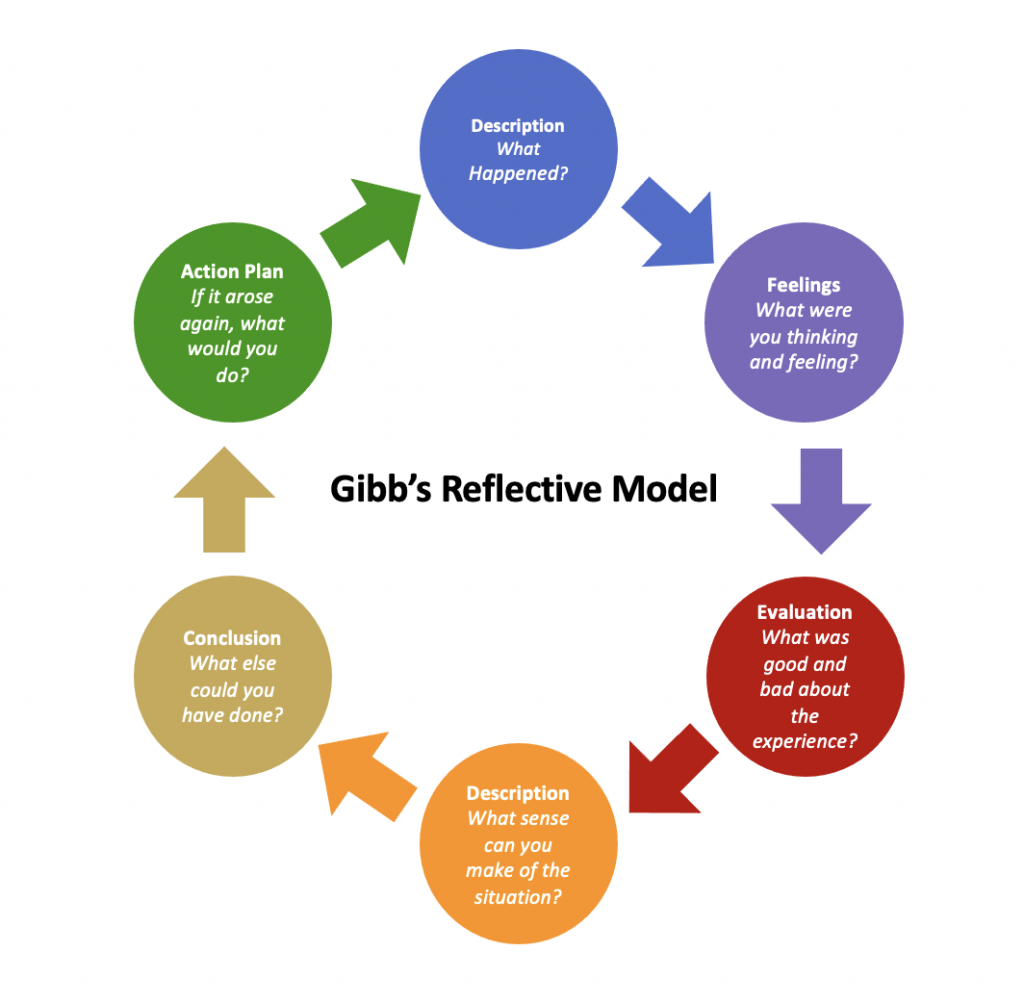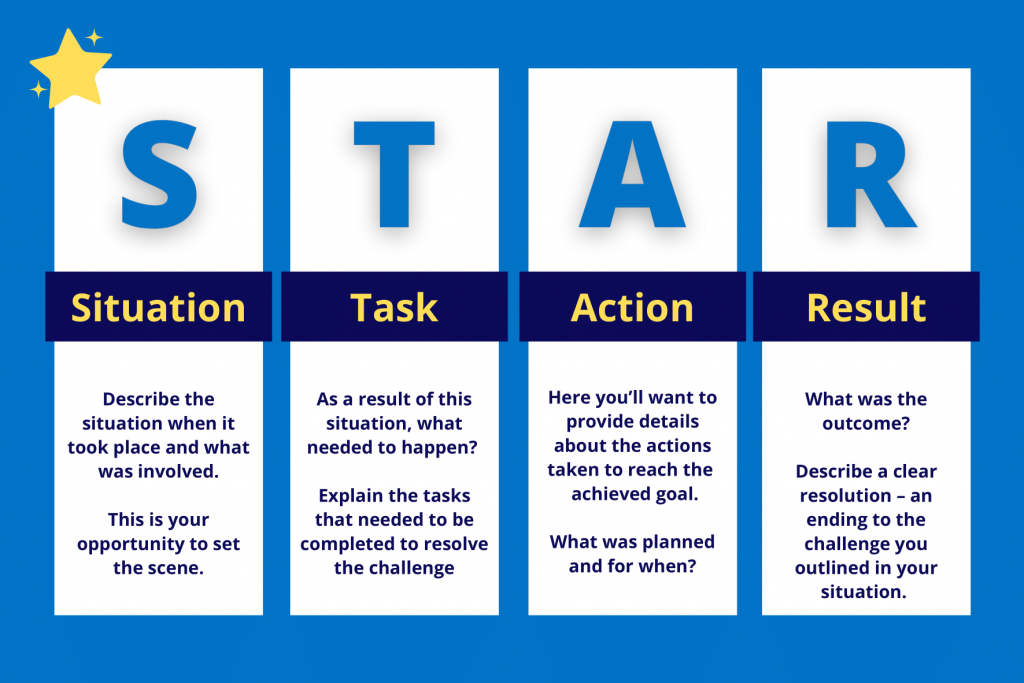Frequently Asked Questions

I will use Gibb’s reflection model to evaluate my experience of completing a simulated interview for Impact Manager at the BBC by analysing my actions throughout the process (1998).

Description
After many hours of researching jobs in the charity, community, and creative sectors, I decided to interview for the role of Impact Manager for Northern Ireland at the BBC for Children in Need. So far on my placement as a Festival Assistant with the Open House Festival, I have worked across multiple areas in the organisation including spending time with front of house and co-ordinating volunteers. In turn, I knew that my experience talking to the public and witnessing how public funding allows all members of the community to experience the arts would be invaluable experience for this job. In addition, I have undertaken a grant researching project where I collated the details of dozens of grants from a variety of databases, analysed them to establish their suitability for the organisation and to ensure that each grant would be a worthwhile application for the organisation.
During the interview, I was asked a series of character and competency-based questions to challenge my suitability for the role in which I used the S.T.A.R. technique to structure my answers.
Feelings
When preparing for the interview, I analysed the job description, knowing it would be inevitable that questions would stem from this, with the potential of branching out to other closely related topics. I also reminded myself of my ability to confidently converse with people, an invaluable skill I have gained from my placement which I knew would stand me in good stead for this interview.
On interview day when waiting to go into the room in front of the panel, I started to become anxious and increasingly unsure whether my preparation was ample enough to satisfy the panel. I also began to question if the experience I had gleaned from my placement would be sufficient for me to perform well in the interview or be considered for the role in the current job landscape.

With these intrusive thoughts, I became more and more anxious as my heart started to beat faster with breathing becoming shallower, and I began get sweaty palms and fidget with my fingers. Attempting to come across as confident, I sat up straight, smiled at the panel, took a few deep breaths, and began my answers. Throughout my interview preparation, I was introduced to the S.T.A.R. technique which helps to structure and present answers coherently and confidently: Situation, task, action, and result. Throughout the interview, I extended the S.T.A.R. technique to include a short reflection helping to conclude my answers. The S.T.A.R. technique was vital in helping me stay calm in the interview as I had a set of answers rehearsed. In addition, it helped having sets of answers which reflected on different experiences in the same setting which were adaptable to meet the requirements of different questions.
Evaluation
At the end of the interview once the panel convened to discuss my answers and I returned to the room, I was provided with peer feedback which was beneficial from all aspects. The feedback I gained from the process focused on presenting myself well with strong answers and confident body language.
The primary concern was to not get too nervous and to channel my nerves in a positive way, so they don’t affect other elements of my presentation; I was told that I began to speak quite quickly and did not provide through context at the beginning of my answers. Moreover, I forgot to include key words of the questions in my answers and primarily focused on the task and action elements of my S.T.A.R. answers.
Description
Having evaluated my interview experience from beginning to end, I believe I now have a greater understanding of the job market in the creative industry. It was difficult to find a job that aligned with the current experience I have whilst considering the suitability of what sector I wish to work in. With the experience I have gained from completing my placement, I have the option of working as a freelancer in the arts, or voluntary sectors or in a salaried position for similar organisations. Whilst I have enjoyed the tasks assigned to me on my placement, I have considered the implications of working as a freelancer; Primarily the fact that I would need to have multiple streams of income to support myself, like spinning plates. I now believe I would like to have a career in an organisation in which I am salaried, providing a degree of stability.
Conclusion
I read an article titled Go with Your Gut: Emotion and Evaluation in Job Interviews by Lauren A. Rivera, helping to analyse the emotional aspects of a job interview from perspectives of the interviewer and the interviewee (2015). Rivera suggests that employers value workers who “make them feel good on and off the job” (Godard and Mears, 2009, cited by Rivera, 2015, p.1342). Whilst it is normal to be nervous in an unfamiliar environment such as a job interview, being myself is the most important aspect of the interview as I would like to be part of a team that values me for my individuality. This reinforces my peer feedback making sure I fully consider how I present myself.
In addition, I read Measuring Job Interview Anxiety: Beyond Weak Knees and Sweaty Palms by Julie McCarthy and Richard Goffin (2004). They propose that interview anxiety can be divided into five categories: communicative, appearance or interactional, social, performance and, behavioural (2004, p.612). I appreciate anxiety being categorised this way as it allows me to identify what I need to work on. Considering my findings from Rivera’s article, I know social anxiety is what keeps me awake at night, worrying if I will be liked or valued for who I am.
Action Plan
If I were to find myself in this scenario again, I would not go into it blindly like I did this time. I would not only complete further research into the job but also on how to combat my nerves, not just assume I will be unaffected by the prospect of an interview. I believe I now have sufficient experience to build on and I am able to enhance and refine my skillset in a realistic way so I can improve my presentation and provide intelligent and insightful answers.
Word Count: 1087
Bibliography
BBC Children in Need (2023) BBC Children in Need [Image]. London: BBC. Available from: https://ichef.bbci.co.uk/images/ic/1008×567/p08xz6b7.jpg [Accessed 23 February 2023].
Bolton, G. (2001) Reflective Practice: Writing and Professional Development. London: Paul Chapman Publishing Ltd.
Impact Manager – Northern Ireland (2023) Available from: https://careerssearch.bbc.co.uk/jobs/job/Impact-Manager-Northern-Ireland/65557 [Accessed 23 February 2023].
Jasper, M. (2013) Beginning Reflective Practice. Melbourne and London: Cengage Learning.
McCarthy, J. and Goffin, R. (2004) Measuring Job Anxiety: Beyond Weak Knees and Sweaty Palms.Personnel Psychology, 57 (3), 607-637.
Rivera, L. A. (2015) Go with Your Gut: Emotion and Evaluation in Job Interviews. American Journal of Sociology, 120 (5), 1339-1389.
S1jobs.com (2022) STAR Interview Technique [Image]. S1jobs.com. Available from https://www.s1jobs.com/blog/star-interview-technique-method-example-questions/ [Accessed 23 February 2023].
SIMULATED INTERVIEWS
You May Also Like

The World of Theatre upon Reflection
30 November 2022
Interview a New You! – Becoming an Interview Guru
24 February 2023
